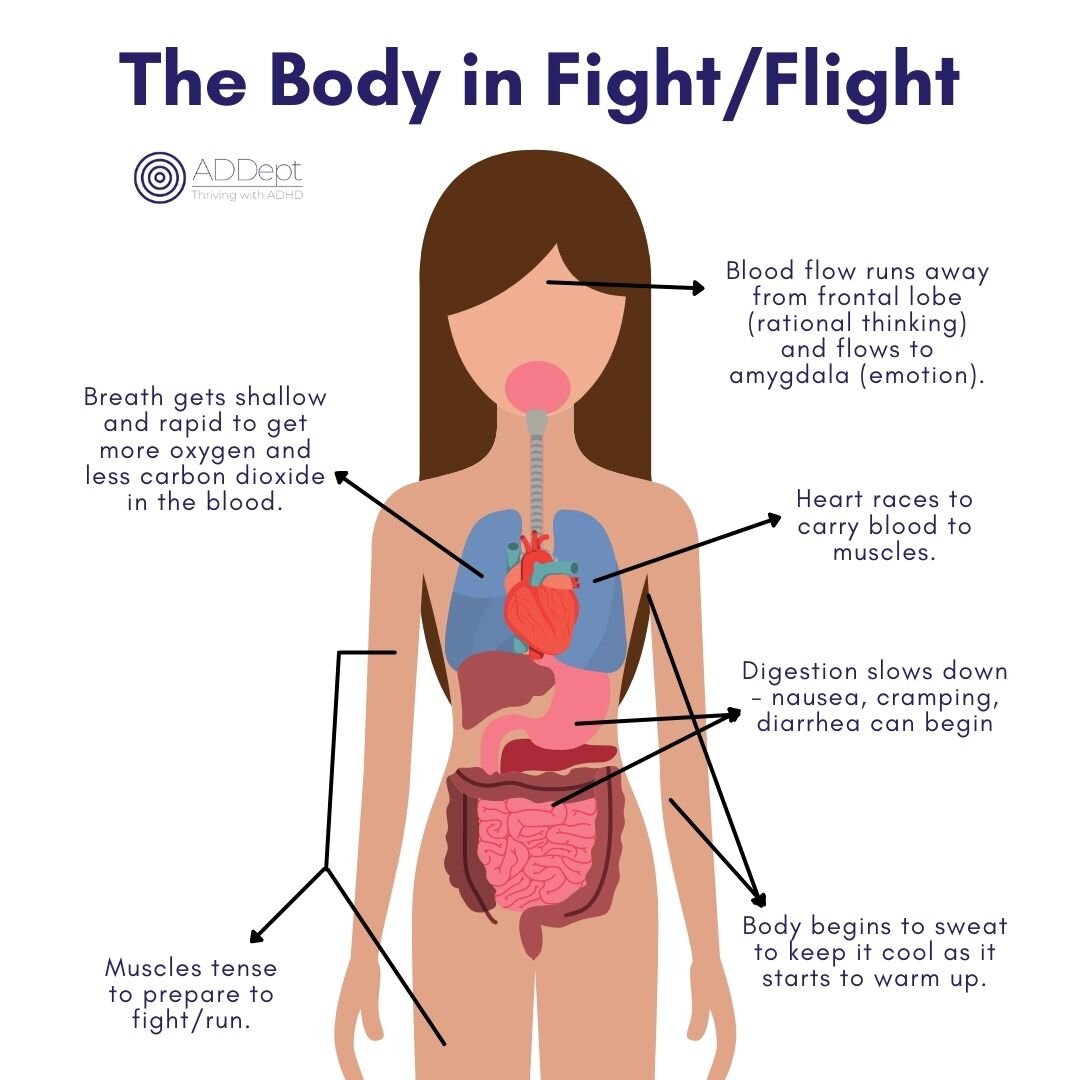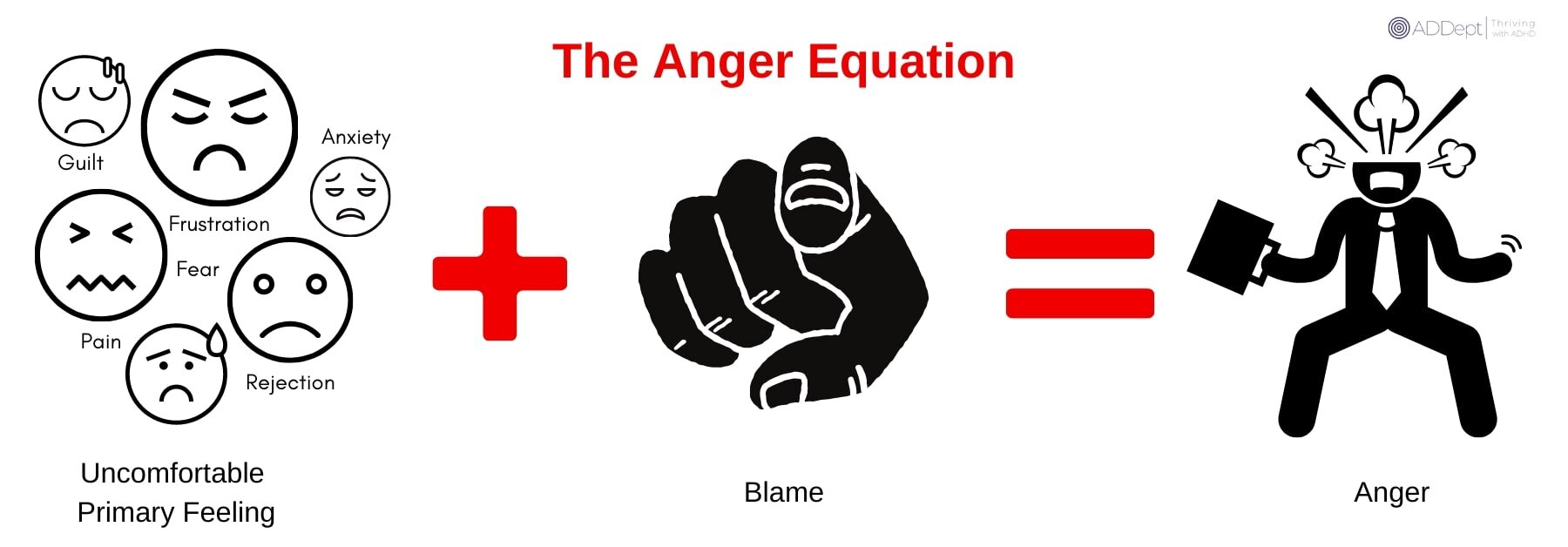ADHD and Anger: Why do I get so Angry all the time?
[2024 Update]
ADHD brains are more likely to experience anger more often, feel anger more intensely, and express anger more aggressively than neurotypical brains because of 5 neurocognitive and environmental differences that cause them to process information and stimulation differently.
Getting cut off on the highway, your mother-in-law criticizing your parenting, your boss insisting you work through the weekend, and your computer dying in the middle of your unsaved, 40-page report— what do all these things have in common?
The ability to inspire rage.
Pure, unadulterated, screaming your head off, throwing your phone against the wall kind of rage. Not only are ADHD brains more prone to this overwhelming emotion (1), but they’re more thrown off by it when it comes their way(2). Why? Well, let’s dive in and find out:
What is anger?
Sure, we all know what it feels like to be angry- that particular agony of anger boiling inside- but what happens inside our brains and bodies when we get all rage-y?
the physical processes of the fight/flight/freeze response
Anger is your body and brain’s natural response to a threat (2) developed back in our ancient history as a survival mechanism.
Back when we all lived in a world where we had to be wary of lions, tigers, and bears- we developed a keen ability to sense a threat, and our bodies created a powerful mechanism to fight that threat off—- our fight/flight response.
This fight/ flight response is triggered deep within our brain to get our body (and our brain) ready to fight its hardest or flee as fast as it can from a dangerous situation.
It makes our breathing fast and shallow (so there‘s as much oxygen as possible in our muscles).
It speeds our heart rate (to pump all that oxygen where it needs to go).
It slows digestion (to divert resources towards more immediately vital processes like our muscles and reaction time).
It shuts down access to our frontal lobe (so we aren’t thinking about our to-do list when we need to escape that pouncing tiger).
And all this readiness? It can mount slowly and gradually, like a pot of water simmering on a stove, or it can explode suddenly like an unexpected fireworks display. (4)
What causes anger?
So, anger is our body’s way of getting ready- ready to fight or run or stay completely still. But anger is just one version of that “ready state”
But why is it that when our body is in that ready state, we feel anxious or panicked sometimes, and other times, we feel like we want to strangle the person in front of us with our bare hands?
Blame.
Anger is something psychologists call a secondary emotion (5). Which means we feel it after we feel something else. I know- sometimes it doesn’t feel that way- sometimes it feels like there’s absolutely nothing in that split second between getting cut off on the expressway and the utter rage you felt a second later. But if you were to take that single second of your life and play it out in slow motion, you’d likely see a flicker of another super uncomfortable emotion right before that rage. Maybe fear? Frustration? Or even anxiety?
We feel that uncomfortable feeling, and we hate it. So, our brain goes in search of someone or something to blame it on. Because when we find the blame, we get to switch from that uncomfortable, torturous, and ultimately helpless feeling of fear, frustration, or anxiety over into energy and action-oriented anger, which often feels preferable.
ADHD and Anger: What’s the Relationship?
Ok. So, we’ve gotten all technical on anger itself, but what’s the deal with ADHD brains, and how anger impacts them?
It turns out quite a bit, actually. Research shows that ADHD brains are:
more likely to experience anger (7)
feel anger more intensely, (7)
more likely to express their anger in outbursts or aggression. (7)
Why so much anger? Well, let’s dive in and find out:
Think you might have ADHD?
Take a free online assessment to find out.
(Takes 3 minutes)
TAKE THE QUIZThe 5 Main Reasons ADHD Brains Struggle with Anger
Anger Regulation
70% of adults with ADHD report experiencing either more frequent or more intense anger and other emotions than neurotypical brains. (6)
When we think about this- it makes sense because, at its base, the primary difference of the ADHD brain is one of regulation. And it doesn't discriminate about what it struggles to regulate- focus, attention, awareness- they all operate with the same on/off switches that typify an ADHD brain.
While it’s overly simplistic to say that ADHD brains have an on/off switch for emotions, the various cognitive functions that play into emotions do operate in that all-in/ all-out way, leading to the experience of going all-in or all-out on emotions as well.
Which means we tend to feel completely fine one minute and then consumed by rage the next.
Overstimulation
ADHD brains have a different way of processing information, which tends to allow in a lot more information in than a neurotypical brain, which is the result of several neurocognitive differences:
A “leaky filter”: that doesn’t filter out as much irrelevant or extraneous information (8)
Heightened Salience: which identifies more information as important than is typical (9,10)
Reduced Inhibitory Control: which keeps out the extraneous thoughts/ feelings, etc. (11)
So, the ADHD brain is letting more in from the outside, seeing more as important and not keeping out extraneous internal thoughts. When you roll this all together, it results in a brain that’s essentially under siege- receiving a deluge of extra stimulation every moment of every day.
This constant bombardment causes our primal fight/flight system to go on alert-- priming the brain to seek out all possible threats. Not only does this alert keep us (at least theoretically) safe. It also has the added benefit of getting us out of the discomfort of anxiety/ fear/ pain and into the more active (and therefore less helpless, if not more comfortable) feeling of anger.
Other Contributing Conditions
ADHD brains are more likely to also experience other conditions such as Oppositional Defiant Disorder, Conduct Disorder, Intermittent Explosive Disorder, Depression, and Anxiety. (12, 13, 14, 7) Each of these additional conditions can make an ADHD brain more likely to feel anger and to feel it more intensely when it comes up.
*While co-occurrence is very real. I always like to point out so is misdiagnosis. Because the emotional aspects of ADHD have not always been well understood, I think it’s important to make sure that clinicians who are diagnosing are very familiar and experienced with ADHD brains and able to differentiate between the typical emotional experiences of ADHD brains and additional primary or secondary conditions.
The Perception of Malice
When we walk around in the world, we come face-to-face with thousands of pieces of information that aren’t 100% clear- like the sour-looking expression on the face of the person passing you on the street. How we then respond to that scowly person depends a lot on the story that we tell ourselves about what put that scowl on their face, to begin with– if you decide they’ve got a bee in their bonnet because they think you’re funny looking, you’re likely to react differently to them then if you decide they must have just lost a lemon sucking contest.
There is some research that suggests that ADHD brains are more likely to tell themselves stories that assume the other person either intends harm, malice, or rejection (15).
Now, I want to make a special note here, too- because ADHD brains don’t tell these stories because it’s fun or because they mean to. No- ADHD brains that tend to read situations as hostile or rejecting are doing so usually because they’ve seen a lot of hostility or rejection in their lives, and they decided a long time ago that it was a whole lot safer to assume that people might be out to hurt or reject than to assume the opposite and be caught unaware.
But regardless of the safety intent, when an ADHD brain perceives rejection and hostility all around it, it doesn’t take long before it feels overwhelmed by anger and rage.
Justice Sensitivity
Research has shown that people with ADHD, particularly the inattentive subtype, are more justice-sensitive than those without ADHD, meaning that they perceive injustice in the world more often and respond to that injustice more strongly than neurotypical brains. And like most things ADHD related, there are several brain-based reasons for this difference.
The ADHD brain is hypersensitive and intuitive, so it feels the pain of the world intensely. It also doesn't filter out irrelevant details, making it more intuitive and more prone to noticing suffering. Additionally, ADHD kids may struggle with understanding social rules due to a neurocognitive delay, which can lead to overgeneralization and inflexibility. Growing up with ADHD can also result in repeated experiences of injustice, which also heightens sensitivity and the perception of injustice.
And, of course, how do we respond to injustice? A lot of times, we respond with anger.
So if your ADHD brain’s been feeling a whole lot of anger these days, know that there are some very real, brain-based reasons why- you aren’t just a hot-head with a vendetta against the world. You have a unique brain that encounters and processes the world differently, which makes it more vulnerable to anger.
And, of course, because the ADHD brain is more vulnerable to anger, it’s important to find ADHD-friendly ways to manage anger when it comes up so it doesn’t end up demolishing your values, intentions, and goals along the way..
Explore more in Part 2 of the ADHD and Anger series: How to Deal with Anger with an ADHD Brain. Find tips to handle anger with an ADHD brain. Check it out!
Do you find yourself having to manage anger more often? What gets you most enraged? Tell us in the comments below or reach out; we’re here to help!
Ready to shift from
meltdown to mastery?
This online course has been designed specifically to help teach the strategies ADHD brains need to help them move from overwhelm and meltdowns to confident emotional mastery.
Sources:Wilcutt, E., & Barkley, R. (2010). Attention-deficit/hyperactivity disorder in adults. In M. Hersen & R. M. Eisler (Eds.), Adult psychopathology (pp. 195-240). New York: Guilford.Shaw, P., Waschbusch, M., Whitmore, O., & Nigg, J. T. (2012). Emotional dysregulation in attention deficit hyperactivity disorder (ADHD): Longitudinal investigation of developmental pathways. American Journal of Psychiatry, 169, 105-113.Nesse, R. M. (2000). Is there an angry beast within? On the psychobiology of anger. Psychoneuroendocrinology, 25, 615-648.Benarroch, E. E. (2019). Fight or flight response. In: M. D. Fairchild & L. A. Djurica (Eds.), The Gale Encyclopedia of Neuroscience (5th ed., pp. 1965-1966). Gale.Burns, D. D. (2000). Feeling good: The new mood therapy (2nd ed., pp. 123-145). Harper.Shaw P, Stringaris A, Nigg J, Leibenluft E. Emotion dysregulation in attention deficit hyperactivity disorder. Am J Psychiatry. 2014;171(3):276-293. doi:10.1176/appi.ajp.2013.13070966Wilcutt, H. C., Barkley, R. A., Conner, S. R., & Fletcher, K. N. (2012). Emotion dysregulation in ADHD adults: Examining specific deficits and their relation to ADHD subtypes and comorbidities. Journal of Clinical Child & Adolescent Psychology, 41(4), 697-710.Sonuga-Barke, E. J., & Castellanos, F. X. (2005). Spicy meatball! Attention biases and inhibitory control in ADHD. Biological Psychiatry, 57(5), 571-577.Sonuga-Barke, E. J. (2011). The role of the executive system in attention deficit hyperactivity disorder: Does mind wandering hold the key? Journal of Child Psychology and Psychiatry, 52(8), 763-772.Ehrich, T., Schumann, A., & Saßens, M. (2017). Heightened processing of emotionally ambiguous facial expressions in individuals with ADHD. Journal of Child Psychology and Psychiatry, 58(4), 449-458.Biederman, J., & Faraone, S. V. (2005). Attention deficit hyperactivity disorder. Annual Review of Neuroscience, 28(1), 543-634.Biederman, J., Mick, E., Faraone, S. V., & Russell, A. T. (2004). Comorbidity of attention deficit hyperactivity disorder (ADHD) with conduct, mood, and anxiety disorders: Clinical implications. Child and Adolescent Psychiatric Clinics of North America, 13(4), 667-690.Taylor, P. J., Malone, D. P., & McGlone, K. V. (2014). Comorbidity of intermittent explosive disorder and attention deficit hyperactivity disorder in adults. Psychological Reports, 115(3), 639-650.Faraone, S. V., Biederman, J., Mick, E., & Russell, A. T. (2001). Emotional reactivity and attention deficit hyperactivity disorder in children. Clinical Psychology & Psychotherapy, 8(4), 257-265.**Quan, L., Huang, W., Huang, Y., & Zhao, X. (2019). Emotion dysregulation, hostile attribution bias, and aggression in children with attention deficit hyperactivity disorder. Child Psychiatry and Human Development, 50(5), 852-861.
Want to know more about
thriving with ADHD?
Check out these other articles:













Why We Can’t “Just Tune It Out”
Hypersensitivity, Sensory Sensitivity and the ADHD Experience